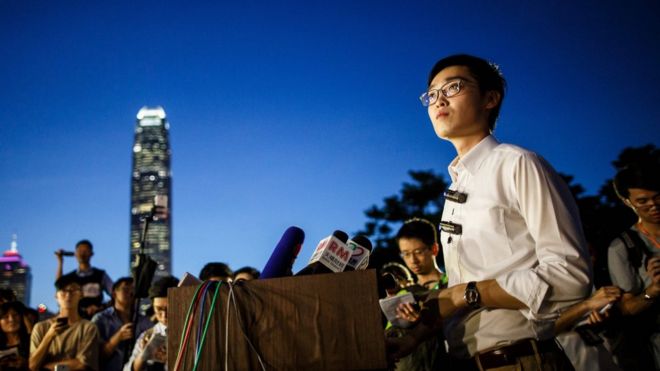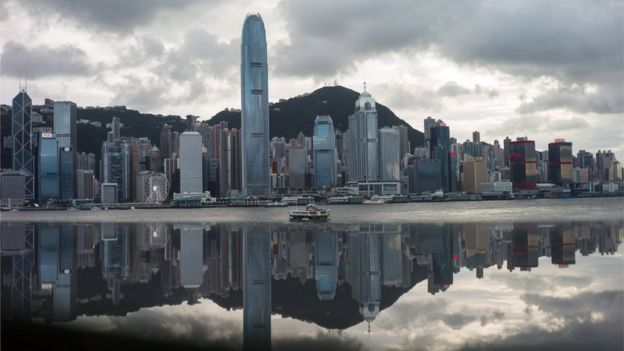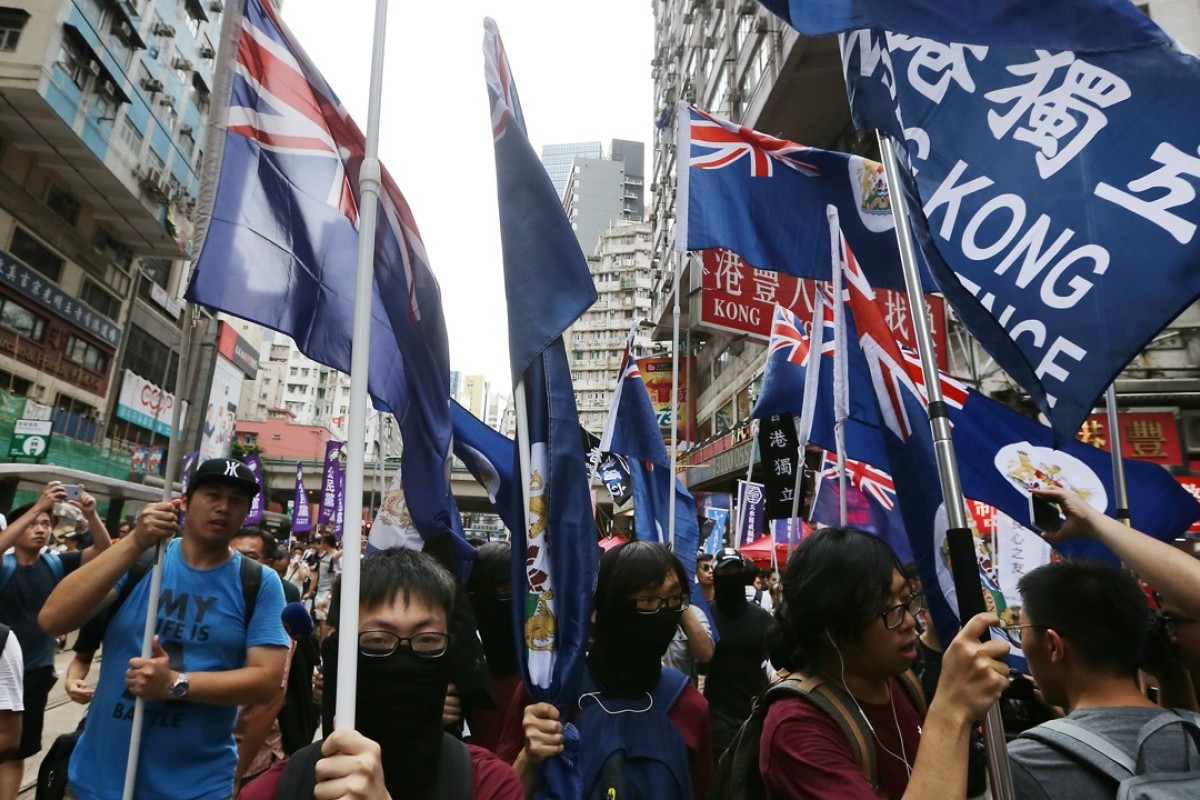By Shibani Mahtani and Gerry Shih

Democracy activist Joshua Wong addresses crowds outside Hong Kong’s legislature during a demonstration against the extradition bill on June 17.
HONG KONG — Authorities widened a crackdown on the pro-democracy movement in Hong Kong with the arrests of prominent activists, underscoring Beijing’s growing intolerance of sustained street protests that have convulsed the Chinese territory and revived calls for universal suffrage.
Joshua Wong and Agnes Chow, who rose to eminence as the student leaders of pro-democracy demonstrations five years ago, were detained early Friday, ahead of what was expected to be another weekend of clashes in the city.
Police said the pair would face charges of participating in an unauthorized assembly and inciting others to participate in an unapproved assembly, while Wong would face an additional charge of organizing an unapproved assembly.
The charges relate to a June 21 protest where demonstrators surrounded police headquarters.
A third activist, Andy Chan, the leader of a banned pro-independence party, was arrested at the city’s airport late Thursday while trying to board a plane.
Police said he was detained on suspicion of rioting and assaulting a police officer.
The arrests come at a tense time in the semiautonomous Chinese territory, where an official proposal to allow extraditions to mainland China triggered months of protests that have descended into street battles with police.
As demonstrations have turned violent, and grown to encompass a broader push for democracy in Hong Kong, authorities have stepped up arrests and the use of force.
The dissent coincides with a politically sensitive moment for the ruling Communist Party, as the clock ticks down to the 70th anniversary of the founding of the People’s Republic of China in October.
China’s government has issued increasingly strident threats in an effort to quell the unrest.
A day earlier, it sent a new batch of troops in to Hong Kong to reinforce the People’s Liberation Army garrison in the city.

Agnes Chow, right, and Joshua Wong outside government offices in Hong Kong in June. The pair were arrested Friday in a widening crackdown on the pro-democracy movement.
Friday’s arrests, combined with the Hong Kong garrison rotation and rumors that Hong Kong may invoke emergency laws, were “extremely alarming,” said Samantha Hoffman, a fellow at the Australian Strategic Policy Institute who studies Chinese politics.
“At the very least, it is clear that Beijing is attempting to intimidate the people of Hong Kong. The Chinese Communist Party places political protests very high on its list of threat perceptions,” she said.
“The party will protect itself before it defends the objective interests of China, the Chinese people, and Hong Kong and its people. Therefore, it is hard to imagine a solution where the party backs down in any meaningful way.”
In a report after the roundup of the Hong Kong activists, China’s official Xinhua news agency said more arrests were expected.
Hours later, Xinhua posted a picture on its social media account with a pair of handcuffs and images of the detained trio with the caption “What goes around comes around.”
A local pro-democracy councilor, Rick Hui, was also arrested Friday, his office said.
Charges against him were not immediately known.
With Hong Kong’s leader, Carrie Lam, unwilling to compromise on demonstrators’ demands, the continued unrest is taking a toll on the economy.
Police have arrested more than 800 people in connection with protests that have rocked the city since June, some of them on riot charges that can attract a prison sentence of up to 10 years.
Organizers of a planned march in Hong Kong this weekend called off the rally on Friday after police refused to authorize it.
“Our first principle is always to protect all the participants and make sure that no one could bear legal consequences for participating in the protest,” said Bonnie Leung, a convener of the Civil Human Rights Front.
Wong, 22 years old, became known as the face of the 2014 Umbrella Movement, a 79-day street occupation aimed at securing universal suffrage for Hong Kong.
He was charged and sentenced several times in connection with those protests, and served three stints in jail.
Most recently, on May 16, Wong was sentenced to two months in prison after losing an appeal against a prison term for contempt of court.
He was released in June.

Policemen pull out their guns after a confrontation with protesters in Hong Kong on Aug. 25. Police have escalated their use of force in trying to quell demonstrations.
Along with Chow and another activist, Nathan Law, Wong went on to found political group Demosistō, which advocates self-determination for Hong Kong.
The three were arrested in 2017 ahead of Chinese dictator Xi Jinping’s visit to the city.
This time, the protest movement in Hong Kong has taken a leaderless form — in part to avoid arrests and detentions that plagued its leaders in the past, and to empower a broader base of participants. Unlike in 2014, members of Demosistō have not delivered speeches at rallies, nor have they been prominent faces on the front lines, but have used the group’s social media presence to promote their cause globally.
“We’ll use our influence and connections with the international community to tell the world about what’s happening,” Chow said in an earlier interview with The Washington Post.
“It’s still very important.”
On Friday, Wong was seized at roughly 7:30 a.m. “when he was suddenly pushed into a private car on the street,” Demosistō, said.
Chow was arrested a short time later at her home, Demosistō added.
Both are being held in the Hong Kong police headquarters in the Wan Chai district.
The group has sought help from its lawyers.
Wong and Chow were due to travel to Washington next month, where they were to meet with lawmakers and participate in a congressional Executive Committee on China hearing on the Hong Kong Human Rights and Democracy Act.
The bill, which has bipartisan support, including from House speaker Nancy Pelosi (D-Calif.)and Senate Majority Leader Mitch McConnell (R-Ky.), seeks to punish those who suppress freedoms in Hong Kong including through the use of sanctions and visa bans to the U.S.

Anti-extradition bill protesters take cover from tear gas canisters as they clash with riot police on Aug. 25.
Chan, who founded a party that advocates for Hong Kong independence, was also arrested in August on suspicion of possessing offensive weapons and bombmaking materials.
Hong Kong operates under a “one country, two systems” arrangement within China, under which the city is supposed to enjoy a high degree of autonomy for 50 years following its return to Chinese rule in 1997.
In recent years, concerns have grown that Beijing is tightening control over the territory and working to erode the freedoms and autonomy that distinguish Hong Kong from mainland China.
In a tweet the night before his arrest, Wong wrote that “Being born in uncertain times carries certain responsibilities.”
He linked to a website outlining protesters’ demands.








 Andy Chan says China's pressure proves that Hong Kong should go it alone
Andy Chan says China's pressure proves that Hong Kong should go it alone Hong Kong and China - one country, two systems ?
Hong Kong and China - one country, two systems ?
